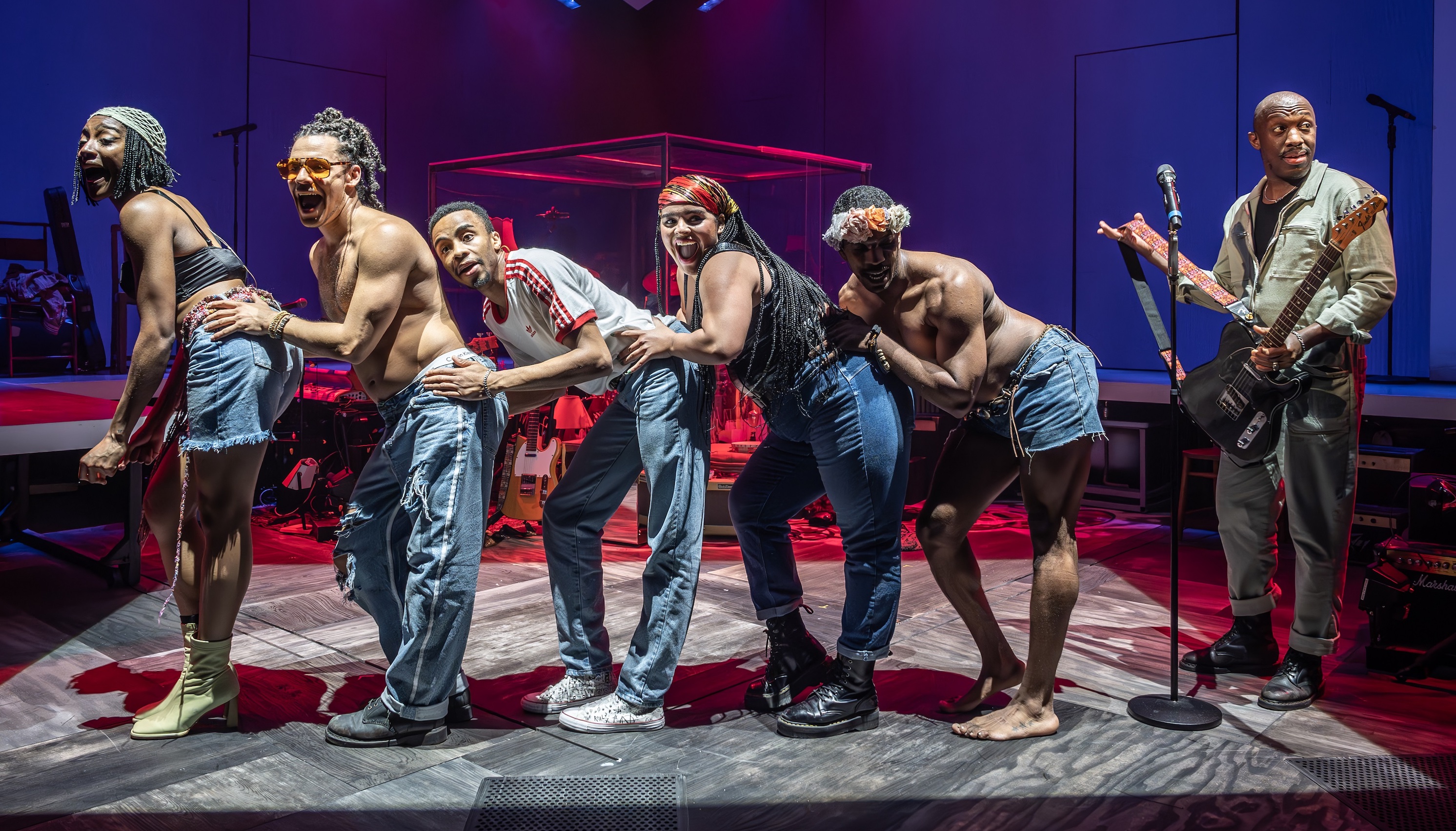From New York’s Public Theater, the venue that nurtured Hamilton, comes another estimable pocket musical, Passing Strange. It was first staged in 2008, to Tony-nominated acclaim, and it shows. Its forthright cheek and irreverence are refreshing and welcome.
First impressions might suggest this is another gig-musical, rather like MJ. The Young Vic’s main space has been tricked out as a recording studio, with a glass booth for a drumkit, flanked by three stations for keyboards and guitar stands. Around the stage area runs a raised narrow platform with sections that can glide in and out. Bursts of excellent visuals are projected on the back wall. But that’s it. The main event is the impressive talent onstage: four bravura multi-instrumentalists, a versatile squad of four actor/singer/dancers in three roles each, two characters known as Mother and Youth, and one called Narrator.
Out of these elements co-writers Stew (aka Stew Stewart) and Heidi Rodewald have fashioned an exuberant but thoughtful piece about Black identity and its struggle for authenticity: specifically, where and how does a creative young Black man find it if home isn’t stirring his juices? Where is his true family? That makes it sound sober and worthy though it’s anything but.
Youth (Keenan Munn-Francis), pronounced “Yoot”, is one such blocked Black teen. We meet him in 1976, living with his mother (Rachel Adedeji) in South Central, LA, an area that has become synonymous with warring gangs and aggressive rap. We may think we know what’s coming, but this narrative does not proceed along predictable lines. Steering it is our subversive Narrator, who arrives, to a dramatic chord on an electric guitar, with a deliciously mischievous air. He will string together scenes from Youth’s life with intros and songs, larding the story with an astute commentary as he goes.
 This is a role Giles Terera (pictured left) was born to play. The Olivier-winning Aaron Burr from the original UK cast of Hamilton shows here what else he can do. He turns out to be a natural axeman with a Fender guitar and a percussionist who can pound a drumkit into submission, not just a singer gifted with a rich, honeyed voice. More importantly, he reels in the audience with his wit and warmth, revelling in the task.
This is a role Giles Terera (pictured left) was born to play. The Olivier-winning Aaron Burr from the original UK cast of Hamilton shows here what else he can do. He turns out to be a natural axeman with a Fender guitar and a percussionist who can pound a drumkit into submission, not just a singer gifted with a rich, honeyed voice. More importantly, he reels in the audience with his wit and warmth, revelling in the task.
Blackness here is being interrogated from within, in an affectionate way. To pounding rhythms and screaming guitar riffs, Youth follows his dreams, but our Narrator is there to gently puncture them and save the story from self-seriousness. So when Youth’s mother starts a typical sing-song rant at her errant son, in rhyming couplets, our Narrator quickly points out that she is using the church voice Black people deploy, then drop as soon as they get home. (Cue hoots of recognition from the Black members of the audience.) He keeps Youth in his cross-hairs, you come to suspect, because he is an older, wiser version of the same character.
The action kicks off when Youth’s mother urges him to go to church (unable to afford outfits for the competitive “Christian catwalk” there, she doesn’t attend herself). Atheist Youth duly goes along and, lo, has a religious experience, responding to the rock’n’roll of the service. He is rejected by a girl with “an Ebony magazine smile’, who wants him to put “more soul in his stroll”. He is also introduced at Prayer Circle to his first joint, offered by the pastor’s camp son, Mr Franklin (Caleb Roberts, pictured below second from right). Franklin has been nowhere, but he dreams of Europe and consumes its culture, name-checking Bergman’s Persona, Camus’s L’étranger, Godard’s Bande à Part. All these references are unknown to Youth, but he is totally gripped and resolves to move to Amsterdam to “find himself” and his art. That is, order hashish off the cafe menu and have interesting sex.
What follows are Youth’s encounters with life-changing people and their drugs du jour. It’s a Candide-like progress, with less naïveté. He finds a new happiness with hippy Marianna (Nadia Violet Johnson, pictured below, far left) and her pals in Amsterdam: cue for a touching number about her door keys, which she gladly hands over to him – an act of trust he has never experienced before. But he realises songwriting pearls need more grit, so he moves on to the dark side, Berlin, and the tutelage of radical politico Desi (Renée Lamb) and her gang at the Now-haus. At each stage he yearns for the “real”, but paradoxically, is told he represents the real, the Black One, the authentic voice of the American ghetto.
Structuring this odyssey are the musical styles of the time, from the bluesy gospel of the 1970s, shading into punk when Youth forms a band, the Scaryotypes, in Amsterdam, then going techno In Berlin, where he becomes a performance artist who goes wildly over the top. All the performers join him there – David Albury, as a man freaking out at turning 30, Lamb as screaming punk bassist Sherry, and Roberts as a madly mohicaned Berliner astride a toilet, in a solo steeped in Kraftwerk. On the walls are projected exaggerated parodies of the art-house films of the time.  Youth moves through these different phases almost as a pasticheur himself, ever in search of a songwriting style to call his own. When he finally makes a breakthrough, it’s not the way he expects. His songwriting is his reality, his home, he decides – but is it yet another mask he puts on? (The “passing” in the title does not mean what it does when Othello uses it, but is a spin on the phrase “passing as white”.)
Youth moves through these different phases almost as a pasticheur himself, ever in search of a songwriting style to call his own. When he finally makes a breakthrough, it’s not the way he expects. His songwriting is his reality, his home, he decides – but is it yet another mask he puts on? (The “passing” in the title does not mean what it does when Othello uses it, but is a spin on the phrase “passing as white”.)
This is a lovely show, rather like watching best mates strutting their stuff and having a ball. The material is delivered with the inclusiveness of a gospel service, with performers racing through the audience as Terera whips things along. Yet at its core is a wistful understanding of the essential loneliness of the artist that gives the piece a touching grace note on which to end. It’s immaculately delivered by Terera at his most tender.















Add comment